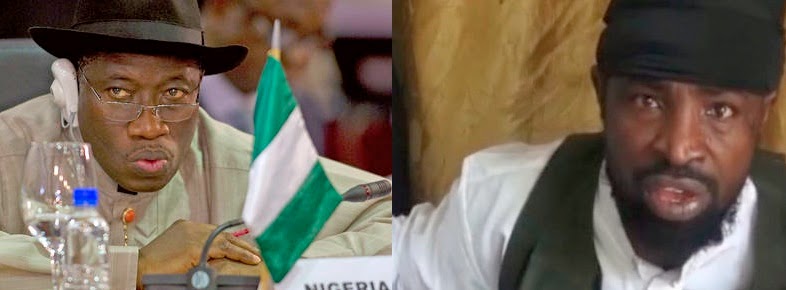Nigeria’s President Goodluck Jonathan on Friday said the military
hopes to recapture towns seized by Boko Haram within a month, in what
would be a swift victory after six years of bloody conflict.
But experts warned against any premature declaration of victory,
with the militants still proving capable of carrying out deadly
hit-and-run strikes and indications of coalition lapses.
Jonathan, who is seeking re-election on March 28, said Boko Haram was “getting weaker and weaker every day”.
“I’m very hopeful that it will not take us more than a month to
recover old territories that hitherto have been in their hands,” he told
the BBC.
Nigeria has claimed major gains against the Islamists with the help
of coalition partners Cameroon, Chad and Niger, achieving in just over
one month what for years it had failed to on its own.
Two out of three of the worst-hit northeast states — Yobe and
Adamawa — have been declared “cleared” while the third, Borno, is
expected to be liberated “soon”, the military said this week.
Major towns such as Bama and Dikwa are among some 36 localities recaptured, with just three said to be still in rebel hands.
National security advisor Mike Omeri said on Wednesday that “the final onslaught” was under way.
More than 13,000 people have lost their lives in the conflict and
the main opposition candidate, former military ruler Muhammadu Buhari,
has campaigned hard on the government’s security record.
Mark Schroeder, vice-president for Africa analysis at security risk
consultants Stratfor, said announcing victory before March 28 made
political sense for Jonathan as part of the election campaign.
“The risk he runs, however, is that the insurgency is not really
defeated, only disrupted temporarily and for political posturing,” he
told AFP.
“It would be akin to the ‘Mission Accomplished’ declaration by (US)
President (George W.) Bush in 2003 that was a premature symbol of
victory in Iraq.
“Clearly, Iraq is still today struggling with an Islamist insurgency.”
Until this year, Nigerian troops had appeared unable — even
unwilling — to tackle the better-armed militants, who have allied
themselves with the Islamic State group in Syria and Iraq.
Jonathan acknowledged to the BBC that a lack of resources was to blame.
Nnamdi Obasi, senior Nigeria researcher at the International Crisis
Group, attributed the sense of urgency to the prospect of defeat by
Buhari.
“That urgency facilitated the delivery and deployment of new
military hardware, including assets more relevant to counter-insurgency
operations,” he said.
Improvement had been seen in command and deployment structures,
including the use of senior officers to lead combat operations, special
forces and co-operation with local vigilantes.
The involvement of foreign military contractors, many of them South
Africans, to provide technical expertise may also have made a
difference, he said.
“Offensives by the military forces of neighbouring countries have
helped to overstretch the insurgents and thus undermine their ability to
withstand Nigerian military offensives,” he added.
A Boko Haram attack on the border town of Gamboru on Wednesday and
Thursday killed 11 civilians and gave an indication of the difficulties
in bringing a definitive end to the violence.
The incident highlighted possible co-ordination problems among the
allies, as Chadian troops, who had recaptured the town, had withdrawn
but were not replaced, according to residents.
The Nigeria Security Network of analysts on Thursday meanwhile
warned that Boko Haram would revert to its guerrilla campaign of
bombings and suicide attacks in the face of military pressure.
Fears remain about the safety of voters on polling day, after a
spate of suicide attacks in the north in recent weeks and after Boko
Haram leader Abubakar Shekau vowed to disrupt the election.
In the short-term shattered lives and infrastructure needed to be
rebuilt, while longer term, Nigeria needs to tackle the root causes of
the insurgency to prevent it flaring again, experts said.
The Borno Elders Forum on Wednesday warned that it was “too early to
even start talking about any of the (1.5 million) displaced going back
to any of these reclaimed territories”.
The forum’s chairman, Usman Gaji Galtimari said many areas appear to
have been mined, while there have still been repeated attacks in areas
said to have been recaptured.
(AFP)
About Author
Discover more from BillionBill
Subscribe to get the latest posts sent to your email.
